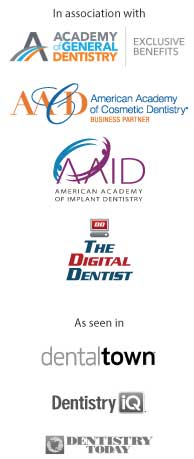Are you struggling to break free from insurance contracts restricting your practice growth? If so, you’re not alone. Unfortunately, many dentists feel tethered to their plan and find it difficult to transition away from restrictive policies. To help us understand the challenges and solutions of leaving insurance contracts, we visited with Eric Vickery, President of Coaching at All-Star Dental Academy. Eric is well-versed in the hurdles of resigning from restrictive insurance plans, having guided hundreds of practices through the transition to fee-for-service.
Eric joined us in another episode of the Dental All-Stars podcast where he shared more about case acceptance. Here’s a summary of our conversation.
The biggest mistake offices make when it comes to case acceptance
The biggest mistake offices make when it comes to case acceptance is not understanding that every profession has some sort of sales involved. People in the dental industry, especially dentists and team members, often think that they don’t have to be salespeople – that they are only in the healthcare business. But the fact is, in order for a patient to accept the treatment recommended, they have to “buy-in” to what’s going on clinically and accept the diagnosis.
This means that teaching dentists and team members how to communicate from this perspective is essential for successful case acceptance.
Another mistake that people make is pressuring patients into accepting treatment by simply saying, “You need a crown.” This places emphasis on money, which can make the patient uncomfortable or hesitant. It’s important to move away from this “need” category and into a “want” category instead.
Getting patients to move forward without high-pressure sales tactics is an eye-opening experience for dental teams, as they learn that they don’t need to be hard-core salespeople to be successful. By focusing on health and diagnosis, they can foster an environment of trust and understanding with their patients. A deeper relationship will result in higher case acceptance rates.
What offices need to realize in order to improve case acceptance
In order to improve case acceptance, dentists need to understand that patients are unlikely to make a decision if they do not perceive there to be a problem. That is why it is important to have a complete understanding of the issue and be able to provide a solution to the root of the problem. If a patient does not have any pain, they may not even perceive there to be an issue and thus will not be willing to make a decision. Therefore, it is essential for practitioners to be able to convey the importance of their services in order to demonstrate how such treatment can help prevent bigger problems in the future.
Moreover, it is also important for practitioners to enable their patients to make an informed decision by recognizing their emotional needs. Practitioners can do this by engaging in conversation with their patients to determine why they are seeking treatment. This could involve questions such as why they want to save their teeth or what they need a smile for. By understanding the patient’s emotions behind making a decision, practitioners can help frame the service in a way that resonates with them.
Ultimately, dentists must realize that their patients make decisions on their own accord for their own reasons and that it is essential for dentists to understand those reasons and inform the patient’s decision-making process.
The “95-5” rule
The 95-5 rule is an essential concept for any dental team to understand. The rule focuses on a ratio of 95% attention and focus being placed on the patient’s condition and the consequences, with only 5% on the treatment.
The idea is that the patient must be given the opportunity to understand and absorb what their condition is and what the consequences of not treating it might be. Once they have had this chance to comprehend, they will be more open to hearing about potential treatments.
Main reasons patients may object treatment
When it comes to patient objections to treatment, money is often cited as the primary factor. Dental offices report that most of the time, when asked what objections they hear, the answer is money. However, it is important to recognize that money is not the root cause of patient objections but rather a reflection of the lack of belief in and understanding of the diagnosis.
Patients will be more likely to invest in treatment if they do not perceive a need for it or are unsure of their diagnosis. Additionally, sometimes patients may be using money as an excuse to delay making a decision or to try and avoid investing in a service that they believe will not benefit them.
The best way to handle patient objections is to prevent them from occurring in the first place. Clinicians should focus on helping patients understand the condition, the consequences of not treating it, and the solution that is being offered. When patients know what is happening and have buy-in regarding the diagnosis, they will have a sense of urgency and be more likely to invest in a solution.
What you can do in your practice tomorrow to improve case acceptance
When it comes to improving case acceptance, the key is to focus on asking, not telling. When practices simply tell their patients what they need to do, it can create an uncomfortable vibe and patients feel pressured into making a decision they may not necessarily be comfortable with. Instead, start a conversation with the patient and use open-ended questions such as “How do you feel about moving forward with this plan?” or “How much sense would it make to move forward with this plan?” This encourages a dialogue that allows the patient to take control of the situation, and it gives them the opportunity to express any objectives they may have.
By asking the right questions and engaging in open dialogue during case presentation, dentists can create a more comfortable atmosphere for their patients that makes them more likely to accept treatment.
Who should attend the upcoming Practice Growth Summit?
All-Star’s upcoming Practice Growth Summit, taking place on May 19th and 20th in Fort Lauderdale, FL, is an event that any team looking to improve the effectiveness of their communication, treatment planning, and case acceptance should attend. The Summit will provide a comprehensive look at how to get patients healthier and serve as an opportunity to get everyone on the team on the same page.
For those looking to take their team’s growth to the next level, having a coach can be beneficial. A coach can provide invaluable accountability and focus on the implementation of the strategies taught at the Practice Growth Summit. Through coaching, teams can dive deeper into the concepts of production per patient/hour, perio percentages, and important aspects of effective communication with patients. With a careful measurement of KPIs, coaches can help teams reach the highest standards of success.
In short, everyone looking to make their team more effective should attend the Practice Growth Summit and consider investing in coaching services. With these tools in hand, teams will be able to make great strides toward increased success.
Learn more about the All-Star Practice Growth Summit: https://www.allstardentalacademy.com/live-event
Subscribe to the Dental All-Stars Podcast:
Apple Podcasts: https://podcasts.apple.com/us/podcast/dental-all-stars-dental-practice-training-systems/id887322180
Spotify: https://open.spotify.com/show/7CAKkvNddKTuRK1pmfAbDP









